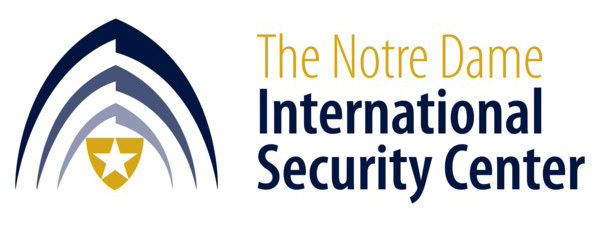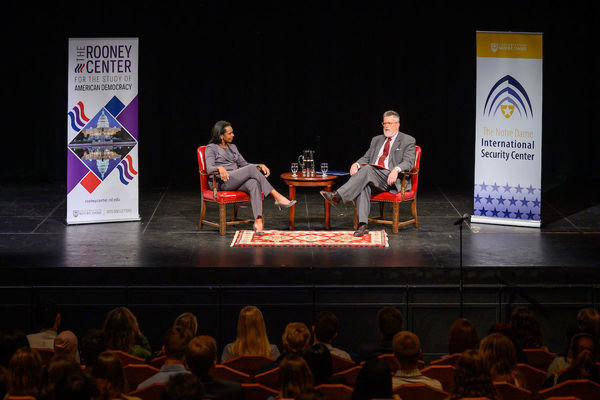
Over the last three years, the Notre Dame International Security Center (NDISC) has added faculty and postdoctoral fellows, expanded its undergraduate and graduate programs, and become a thought leader on issues surrounding national security and innovative approaches to U.S. grand strategy.
The center is now continuing to build on that success with $7.66 million in new grants — $4 million from the Menard family and $3.66 million from the Charles Koch Foundation.
“We’ve grown from a small program to a center in which our faculty have been productive as scholars and offer a great deal of public affairs commentary on national security issues,” said Michael Desch, the Packey J. Dee Professor of International Relations and the Brian and Jeannelle Brady Family Director of NDISC.
“We’ve made huge strides in elevating Notre Dame’s role in some of the most critical national policy debates. Notre Dame is particularly well-placed, with its long history with the U.S. military and close connection in national security affairs, to be a significant voice for thinking seriously about U.S. national security policy in the years to come.”
Inspired by the inscription over an entrance to Notre Dame’s Basilica of the Sacred Heart — “God, Country, Notre Dame” — the center seeks to play a catalytic role in matters of global policy through actionable research guided by the University’s Catholic character.

In an open letter to the Notre Dame community, the Menard family, founders of the Midwest chain of home improvement stores, said the gift is intended to enhance the educational experiences of students, preparing them for future success and inspiring generational prosperity throughout the Midwest.
“A seminal part of the college experience is hearing from people who have a diversity of viewpoints and track record of creating value for others,” the letter said. “At Menards, we want to give more students the opportunity to have that experience and to develop a lifelong love of learning as a result.”
Since 2017, NDISC has hired three faculty members and five postdoctoral fellows, created a nationally recognized seminar series, and partnered with the U.S. Air Force to train its doctoral candidates and with the U.S. Army War College to host its students as fellows. Much of that was funded through a previous $3.66 million grant from the Charles Koch Foundation, and the center has received wide-ranging support since its founding in 2008, including four significant grants from the Carnegie Corporation of New York and endowment support from Gail Weiss and Jack Kelley, Kevin and Cynthia O’Brien, Ann and Mike Long, and Jeannelle and Brian Brady in support of various NDISC programs.
“We’ve made major strides and will continue to do so with the support we’ve received,” Desch said. “The sky’s the limit.”
The next wave of NDISC expansion through 2025 includes naming Jim Webb, a former U.S. senator from Virginia and secretary of the Navy, as its inaugural distinguished fellow; creating the Hans J. Morgenthau Fellowship program for up to 20 pre-doctoral candidates interested in deepening their engagement on national security issues; adding a visiting faculty program; and expanding the center’s post-doctoral fellows program.
“Notre Dame is particularly well-placed, with its long history with the U.S. military and close connection in national security affairs, to be a significant voice for thinking seriously about U.S. national security policy in the years to come.”
“Over the last 12 years, NDISC has become an important resource for research and scholarship on American foreign policy,” said CKF Executive Director Ryan Stowers. “These initiatives, including the Morgenthau Fellowship, will give students new space to learn about grand strategy, network with peers, and be mentored by NDISC’s incredible faculty. We are excited to continue our support for the program as it seeks to examine the role of the U.S. military and its duty to the American people.”
As the center’s scope expands and evolves, Desch said it will play a key role in one of the most critical issues in the broader national security debate — rethinking post-Cold War U.S. grand strategy that is still based on a Cold War mentality and revising it for an era in which threats are rapidly changing.
“The Cold War is over, and we should rethink how the U.S. defines its national security objectives and how it should go about protecting them,” Desch said. “We’re doing that through cutting-edge, scholarly research that dovetails with major national security issues that are on the agenda. We’re also training the next generation of national security policymakers through our fellowship programs and Ph.D. programs for those in uniform who will be crafting the intellectual framework for the national security debate in the years to come.”


